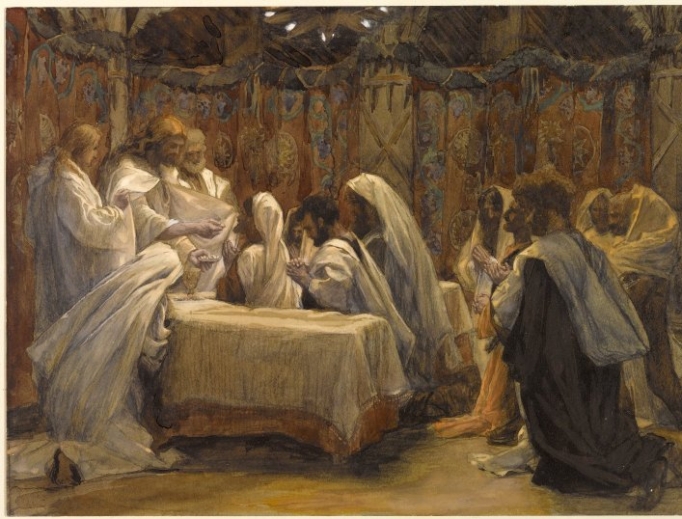CadyandZoe
Well-Known Member
Of course not. I hope you didn't think that I challenged you on that point. I didn't mean to do that. I agree, the followers of John were baptized by John. And of course, Jesus followers were baptized into Jesus.Good morning CadyandZoe,
I have never contested that passage from Luke that said all the people were baptized. In post 1,066 I said, "The followers of John the Baptist were getting baptized." The people that were baptized by John were not baptized into Christ because the Apostles hadn't started baptizing anyone yet. It was later, after his conversation with Nicodemus, that we see them going out and baptizing in the name of Christ. Furthermore, Acts 19:1-5 makes it clear that those that were baptized under John had to be rebaptized.
I apologize. I never actually believed that you doubted John's testimony. In fact, I was counting on the fact that you DID believe John's testimony. My statement was meant to stand in contrast to something you said. It's a common way to carry a discussion forward.
I NEVER said that I 'doubted John's testimony'!!!! Me telling you that you are wrong about there being only one signal to John during Jesus baptism is not me doubting John's testimony. It is me telling you that you have accidently or intentionally left off the 2nd "signal" from God.
Suppose a friend of mine is trying to convince me of something. He might say to me, "Cady, I know you believe 'x', but what you just said would logically lead to a repudiation of 'x'. Maybe you should reexamine your position."
Okay? I meant no disrespect. I thought your point was to say that water baptism is both a prerequisite and a coincidental event associated with the out pouring of the Holy Spirit as witnessed at the baptism of Jesus.
In order to explain my answer, I need to define a term: "sanctification." I understand this in reference to the indwelling of the Holy Spirit as mentioned in Epistles like Ephesians and Romans among others.
In his epistle to the Ephesians Paul speaks about being "sealed in Him with the Holy Spirit of the promise." (Ephesians 1) And in his epistle to the Romans Paul also mentions the idea that the "love of God has been poured out within our hearts through the Holy Spirit who was given to us." (Romans 5) Speaking of those who are no longer condemned, Paul identifies the crucial characteristic for whom there is no longer any condemnation. He tells us, ". . . you are not in the flesh but in the Spirit, if indeed the Spirit of God dwells in you. But if anyone does not have the Spirit of Christ, he does not belong to Him."
Let's call this state, "sanctification": a spiritual blessing of God, the indwelling of the Holy Spirit.
And so the question is whether water baptism is necessary for sanctification. Is God waiting for me to step into the water to sanctify me or will the father sanctify apart from water baptism?
I don't think we can employ the Baptism of Jesus as evidence that sanctification must always be coincident with water baptism. Something entirely different is taking place at the Baptism of Jesus.
This is why I said that I didn't understand your question. I wanted to understand you and I was having difficulty. Your explanation was very helpful and now I understand what you meant. Thank you.How is it you don't understand my question?
Here is what you said: "...the Father caused the spirit to fall on Jesus as a signal to John that Jesus is the one of whom he spoke."
Here was my response (question): "If the spirit falling upon Jesus in the visible form of a dove was a signal to John......There would be no need for God to say that if the descent of the dove upon Jesus was THE very clear signal.
That means there were TWO signals to John AND to all those standing around the Jordan river. The first signal was the dove (Holy Spirit) descending upon Jesus and the second signal was God's voice.
Wouldn't you say that the signal of the dove was clearly understood by John? Wouldn't you say that the Father's voice was intended to help the crowds to understand? I get the idea of two witnesses. I'm just wondering if the first witness was meant for John, while the second witness was meant for the crowds?
You raise a good point. But what do you make of John's testimony here:With that said it appears we both agree that Jesus did NOT need the Holy Spirit, in the form of a dove, to descend upon Him. However, I would contend that the people standing around the Jordan river that day needed a visible sign in the form of a dove (1st signal) and a voice from heaven (2nd signal). You are contending that John needed the signal. I contend that that you are wrong and that CLEARLY John the Baptist did NOT need those signals for he already knew who Jesus was:
John the Baptist came, preaching...saying, “Repent, for the kingdom of heaven has come near.” 3 This is he who was spoken of through the prophet Isaiah: “A voice of one calling in the wilderness, ‘Prepare the way for the Lord, make straight paths for him.’
13 Then Jesus came from Galilee to the Jordan to be baptized by John. 14 But John tried to deter him, saying, “I need to be baptized by you, and do you come to me?”
Looking at those passages makes it clear that your "signal to John" interpretation of Scripture does not match up with what is written on two basis: There were 2 signals (not one) AND John didn't need the signals because he already knew who Jesus was!!!
Bible study Mary
John 1:32-34
And John testified, saying, “I have seen the Spirit descending as a dove out of heaven, and He remained upon Him. And I did not recognize Him, but He who sent me to baptize in water said to me, ‘He upon whom you see the Spirit descending and remaining upon Him, this is the One who baptizes in the Holy Spirit.’ And I myself have seen, and have testified that this is the Son of God.”
My intent is not to disagree with your earlier point. I agree with your earlier point in some aspect. But I need to explore this a bit further.
So what do you make of the fact that John says he didn't "recognize him?"
I don't have a clear answer myself. So we are just talking right? :)





